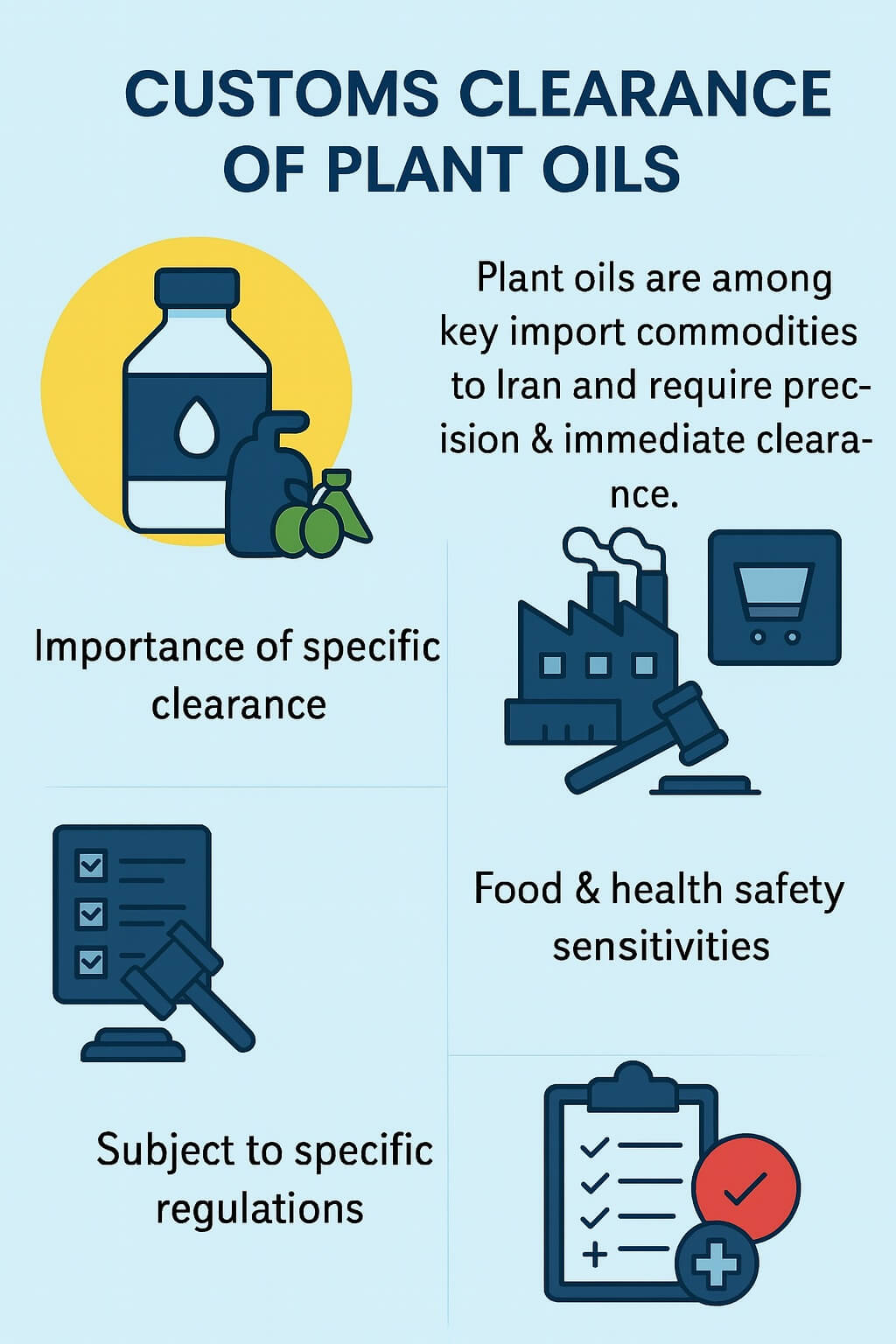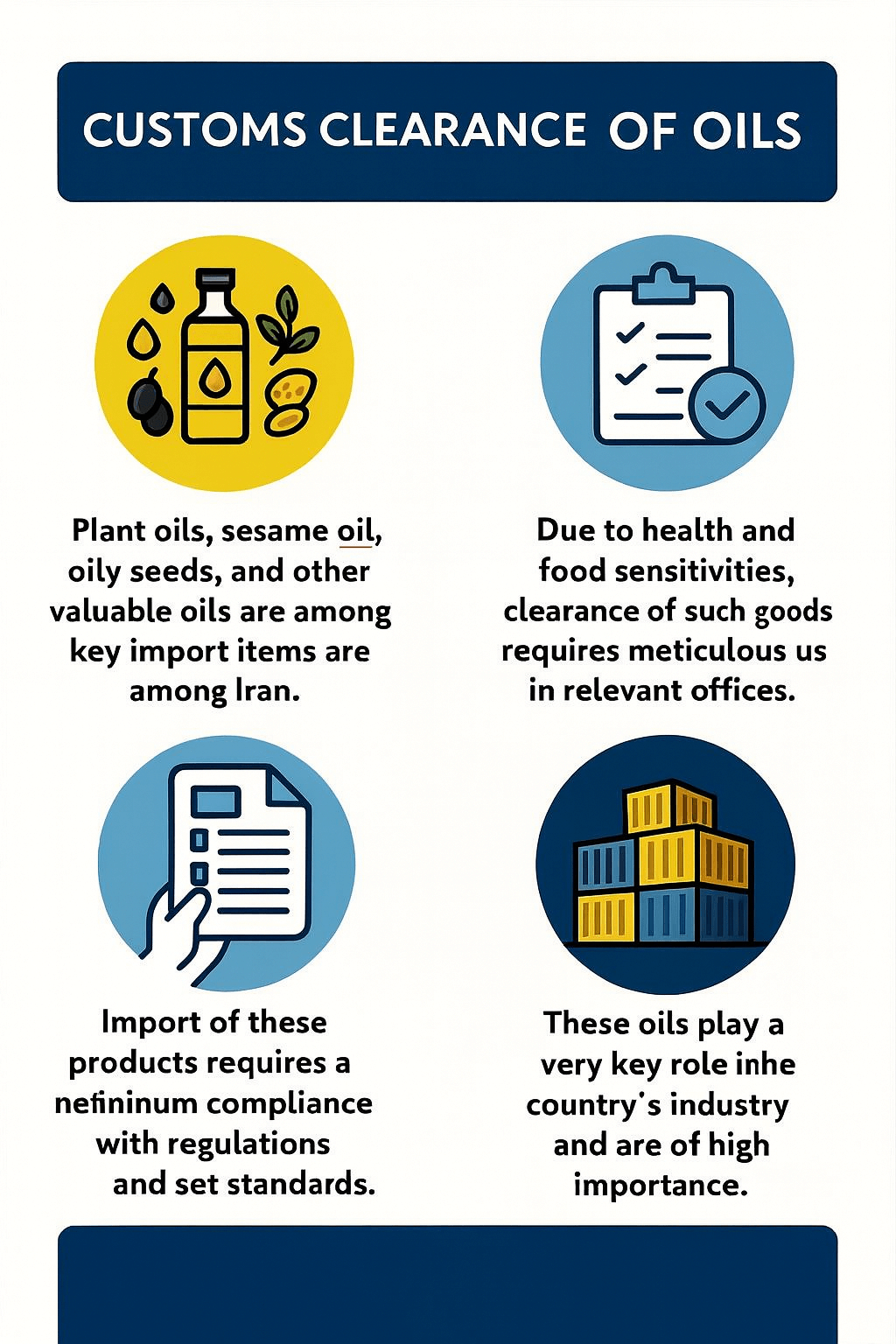Customs clearance of edible oils
Clearing vegetable oils and liquid oils, olive, sesame, and corn is one of the most important parts of importing essential goods to Iran. These products are crucial due to their role in the food industry and meeting the country’s consumer needs, and any import of them is subject to strict compliance with specific laws and regulations. The clearance process for this category, due to food and health sensitivities, must be done with precision.

For estimating the time and cost of clearing edible oils, contact the experts at Saba Tarkhis.
Fast, free consultation2) Customs tariff (HS Code) for edible oils
The Harmonized System (HS Code) is a global standard for classifying goods defined by the World Customs Organization (WCO). Every product in international trade is placed under a specific code which determines the applicable import tariff and taxes.
Olive oil:
Virgin, unrefined olive oil obtained directly from olives: tariff code 150910.
Refined olive oil that has undergone refining: tariff code 150990.
Sesame oil:
Sesame oil, due to its special nutritional and therapeutic properties, falls under tariff code 151550.
Corn oil:
Crude corn oil without refining: tariff code 151521.
Refined corn oil after refining and ready for consumption: tariff code 151529.
Sunflower oil:
Crude sunflower oil: 151211.
Refined and processed sunflower oil: 151219.
Soybean oil:
Crude soybean oil, one of the most widely used vegetable oils: tariff code 150710.
Refined soybean oil: 150790.
Palm oil:
Crude palm oil extracted from palm fruit: tariff code 151110.
Refined palm oil: 151190.
Rapeseed (canola) oil:
Crude rapeseed oil: 151411.
Refined rapeseed oil: 151419.
Coconut oil:
Crude coconut oil obtained directly from coconuts: tariff code 151311.
Refined coconut oil: tariff code 151319.
Groundnut (peanut) oil:
Crude peanut oil: tariff code 150810.
Refined peanut oil: tariff code 150890.
Cottonseed oil:
Crude cottonseed oil: tariff code 151221.
Refined cottonseed oil: tariff code 151229.
Castor oil:
Castor oil, often used in pharmaceutical and cosmetic industries: tariff code 151530.
Other vegetable oils:
Other vegetable oils not included in the above categories and extracted from various seeds: tariff code 151620.
| Oil type | Status | HS Code |
|---|---|---|
| Olive | Virgin/Unrefined | 150910 |
| Olive | Refined | 150990 |
| Sesame | — | 151550 |
| Corn | Crude | 151521 |
| Corn | Refined | 151529 |
| Sunflower | Crude | 151211 |
| Sunflower | Refined | 151219 |
| Soybean | Crude | 150710 |
| Soybean | Refined | 150790 |
| Palm | Crude | 151110 |
| Palm | Refined | 151190 |
| Rapeseed (canola) | Crude | 151411 |
| Rapeseed (canola) | Refined | 151419 |
| Coconut | Crude | 151311 |
| Coconut | Refined | 151319 |
| Groundnut (peanut) | Crude | 150810 |
| Groundnut (peanut) | Refined | 150890 |
| Cottonseed | Crude | 151221 |
| Cottonseed | Refined | 151229 |
| Castor | — | 151530 |
| Other vegetable oils | — | 151620 |
3) Special conditions for importing oils
4) Oil import and export volumes to/from Iran
5) Global circulation of oils
6) Major exporters and importers of oils
7) Required documents for clearing edible oils
-
Order registration in the Comprehensive Trade System: the first step for importing edible oils is to register your order in the system. Without registration and its approval by the Ministry of Industry, Mine and Trade, importing is not possible.
-
Health Certificate: issued by health authorities of the country of origin confirming that the imported oil is safe for consumption in terms of hygiene and safety.
-
Commercial Invoice: includes product type, price, quantity, seller and buyer details, and payment terms.
-
Certificate of Origin: issued by the exporting country’s Chamber of Commerce to determine tariffs and origin.
-
Bill of Lading: includes mode of transport, origin/destination, weight and number of packages; document of title.
-
Import permit from the Food and Drug Organization: confirms health and compliance with Iranian sanitary standards.
-
Customs Declaration: records product type/value, tariff code, and origin/destination details.
-
Inspection Certificate: if needed, to confirm conformity of specifications with standards.
-
Foreign exchange permits from the Central Bank: for allocation of official currency and payment to the foreign seller.
-
Packing List: packaging details to match the invoice and other documents.
-
Business card (trade license): legal authorization for import/export issued by Iran Chamber of Commerce.

Frequently asked questions on oil clearance
What permits are required to import edible oils?
Order registration in the Comprehensive Trade System, Health Certificate from origin, IFDA import permit, customs declaration, and other transport/commercial documents.
How is the HS Code for oils determined?
Based on the source (olive, soybean, corn, …) and processing status (crude/refined). Examples are listed in the HS table on this page.
Why is oil clearance so sensitive in terms of health?
Edible oils are consumed directly; therefore safety, national standards, sampling and IFDA approval are critical.
Special oil clearance services by Saba brokerage
With hands-on experience in clearing edible oils (olive, sesame, corn, soybean, sunflower, …), Saba brokerage shortens your path and reduces risks:
- HS consulting and health requirements based on oil type and processing status (crude/refined).
- Preparing/following up documents: proforma, invoice, CO, bill of lading, Health Certificate, and IFDA permits.
- Coordinating sampling and handling inspections/standards until the clearance permit is issued.
- Managing costs and timelines using preferential tariffs and operational procedures.
- Post-clearance support: domestic transport, insurance, and quality consulting.
.png)
